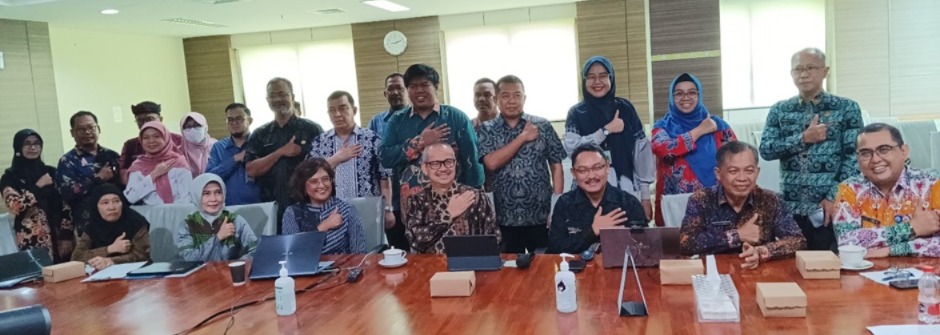Tarakan, 20 September 2024 – In support of sustainable health development goals and the achievement of the Sustainable Development Goals (SDGs), the Provincial Government of North Kalimantan held an Academic Health System (SKA) event on Friday, 20 September 2024, at RSUD dr. H. Jusuf SK Tarakan. This activity is crucial in efforts to meet the sustainable medical workforce needs, particularly in remote areas, and contributes to achieving equitable health access.
The event was attended by various policymakers and experts, starting with remarks from the Director of RSUD dr. H. Jusuf SK Tarakan, who emphasized the importance of collaboration in producing quality medical personnel that meet local needs. “North Kalimantan faces significant geographical challenges, but with the implementation of SKA, we believe that the medical workforce produced will be able to address these challenges,” he stated.
The Director of Health Workforce Provision, Ministry of Health of the Republic of Indonesia, also addressed the audience, highlighting the role of the Academic Health System in the equitable distribution of medical personnel across Indonesia. “SKA is the answer to meet the medical workforce needs according to local conditions and requirements, including in North Kalimantan, which has specific geographical challenges,” he explained.
The next address was delivered by the Head of the North Kalimantan Health Office, H. Usman, SKM., M.Kes., who expressed the importance of mapping the medical workforce needs in community health centers and regional hospitals. “We have initiated this mapping to ensure that every area, from community health centers to regional hospitals, has adequate healthcare personnel,” he revealed.
Presentation: Enhancing Regional-Based Medical Workforce Quality
The first presentation was delivered by Dr. Akemat, S.Kp., M.Kes., who discussed the Academic Health System as a National Policy for Meeting Regional-Based Medical Workforce Needs. According to him, SKA not only improves the distribution of medical personnel but also enhances the quality of health services in areas with specific needs.
The next session was presented by Dr. dr. Sudadi, Sp.An-TI., Subsp.N.An(K)., Subsp.An.R(K)., who discussed the Implementation of the Academic Health System for Meeting Medical Workforce Needs in Community Health Centers and Regional Hospitals across the Kalimantan Province. Dr. Sudadi emphasized the importance of effective distribution of medical personnel, using a regional-based approach to meet health service needs across Kalimantan.
The third presentation was given by H. Usman, SKM., M.Kes., who discussed the Mapping of Doctor and Dentist Needs in Community Health Centers, as well as Specialist Doctors and Specialist Dentists in Regional Hospitals in North Kalimantan Province. He stressed the need for comprehensive mapping to ensure that the medical workforce needs at every level of healthcare facilities are met appropriately.
Panel Discussion: Academic and Medical Synergy for Sustainable Health
The panel discussion, moderated by dr. Haryo Bismantara, MPH., involved academics from Universitas Gadjah Mada. Panelists included Dr. dr. Sudadi, Sp.An-TI., Subsp.N.An(K)., Subsp.An.R(K). (Vice Dean for Cooperation, Alumni, and Community Service FK-KMK), drg. Margareta Rinastiti, M.Kes., Sp.KG.SubspKR(K)., Ph.D. (Vice Dean for Finance, Assets, and Human Resources FKG), dr. Fitriana Murriya Ekawati, MPHC., Sp.KKLP., Ph.D. (FKKMK), and Dr. Akemat, S.Kp., M.Kes. (FKKMK). This discussion focused on Responses and Identification of Opportunities in Meeting Short-term Medical Workforce Needs in North Kalimantan, highlighting the synergy between academic institutions and the health sector in accelerating the achievement of health-related SDGs.
Strengthening Educational Hospitals and Achieving SDGs
In another session, the Director of Health Service Governance, Ministry of Health of the Republic of Indonesia, discussed the Strengthening and Expansion of Educational Hospitals in North Kalimantan Province as an Effort to Achieve Regional Independence in Meeting Medical Workforce Needs. The establishment of educational hospitals and the capacity building of regional hospitals in North Kalimantan will serve as an important foundation for producing quality medical personnel capable of serving the community sustainably in this region.
This panel discussion also featured the Director of RSUD dr. H. Jusuf SK Tarakan and the leadership of Borneo University Tarakan, who dialogued about the Opportunities and Challenges of Adding Educational Hospitals, Study Programs, and/or New Faculties in North Kalimantan. This addition is expected to expedite the region's independence in meeting medical personnel needs while also improving access to better education and health services.
Follow-up Plan and Closing
To conclude, a Follow-up Plan was formulated outlining the steps for implementing the Academic Health System in North Kalimantan. Dr. Haryo Bismantara, MPH, was tasked with drafting a memorandum of agreement signed by policymakers as a manifestation of the collective commitment to support medical workforce independence in the region.
The event closed with the signing of a joint agreement, marking a strong commitment to achieving equitable, quality, and sustainable health access in North Kalimantan, as well as a significant step towards achieving health-related SDG targets by 2030.
This activity opens up collaboration for the advancement of education, research, and community service in the fields of medicine and health. This initiative aligns with theSustainable Development Goal’s (SDGs) diantaranya terutama pada SDGs tujuan ke-17 Kemitraan untuk Mencapai Tujuan, SDGs tujuan ke-3 Kehidupan Sehat dan Sejahtera.
Author: Fidya Alfian

